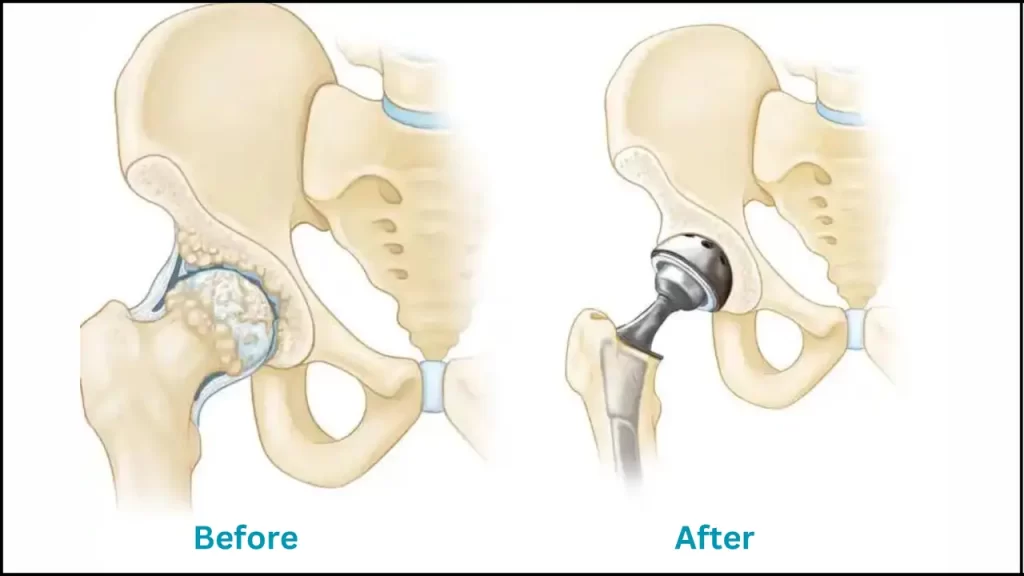Hip Reconstruction Surgery
Hip reconstruction surgery is a significant medical procedure aimed at restoring function and relieving pain in the hip joint. This surgery can greatly improve the quality of life for individuals suffering from severe hip damage due to conditions such as arthritis, fractures, or congenital defects. As a Senior Orthopedic Doctor in Meerut, I, Dr. Tushar Anand, have extensive experience in performing hip reconstruction surgeries, helping patients regain mobility and live pain-free lives.
Understanding Hip Reconstruction Surgery
Hip reconstruction surgery, also known as hip arthroplasty, involves replacing the damaged parts of the hip joint with artificial components. The hip joint is a ball-and-socket joint where the thigh bone (femur) meets the pelvis. When this joint is damaged, it can cause severe pain and limit movement. Hip reconstruction surgery is designed to alleviate these symptoms by replacing the damaged bone and cartilage with prosthetic parts.
Who Needs Hip Reconstruction Surgery?
Several conditions may necessitate hip reconstruction surgery, including:
- Osteoarthritis: This is the most common reason for hip reconstruction. It occurs when the cartilage that cushions the bones of the hip wears away, causing pain and stiffness.
- Rheumatoid Arthritis: This autoimmune disease leads to inflammation of the joints, which can damage the hip joint over time.
- Hip Fractures: Severe fractures, often due to accidents or falls, can damage the hip joint to the extent that reconstruction is necessary.
- Avascular Necrosis: This condition occurs when there is a loss of blood supply to the bone, causing the bone tissue to die and collapse.
- Congenital Hip Dysplasia: Some people are born with a hip socket that doesn’t fully cover the ball portion of the upper thighbone, leading to joint damage over time.

The Procedure
The procedure for hip reconstruction surgery typically involves the following steps:
- Anesthesia: The patient is given anesthesia to ensure they are comfortable and pain-free during the surgery.
- Incision: A surgical incision is made to access the hip joint.
- Removing Damaged Bone and Cartilage: The damaged bone and cartilage are removed from the hip joint.
- Implanting the Prosthesis: The prosthetic components, usually made of metal, ceramic, or plastic, are implanted to replace the damaged joint parts.
- Closing the Incision: The incision is closed with stitches or surgical staples.
The surgery usually takes a few hours, and patients typically stay in the hospital for a few days for post-operative care.
Recovery and Rehabilitation
Recovery from reconstruction surgery involves several stages:
- Hospital Stay: Patients usually stay in the hospital for 3-5 days. During this time, they begin physical therapy to start moving the new joint.
- Initial Recovery: The first few weeks after surgery are crucial for recovery. Patients need to follow their doctor’s instructions carefully, including taking prescribed medications and performing physical therapy exercises.
- Long-Term Rehabilitation: Full recovery can take several months. Physical therapy continues to play a vital role in regaining strength and mobility in the hip joint. Most patients can resume normal activities within 3-6 months, although high-impact activities should be avoided.
Benefits of Hip Reconstruction Surgery
The primary benefits of hip reconstruction surgery include:
- Pain Relief: One of the most significant benefits is the relief from chronic pain caused by hip joint damage.
- Improved Mobility: Patients often experience a dramatic improvement in their ability to move and perform daily activities.
- Enhanced Quality of Life: With reduced pain and improved mobility, patients can enjoy a better quality of life, participating in activities they once found difficult or impossible.
Risks and Complications
Like any major surgery, hip reconstruction carries risks, including:
- Infection: There’s a risk of infection at the surgical site.
- Blood Clots: Surgery can increase the risk of blood clots forming in the legs.
- Prosthesis Issues: In some cases, the artificial hip joint can become loose or dislocated.
- Nerve Injury: Although rare, there is a risk of nerve injury during surgery.
Conclusion
Hip reconstruction surgery is a highly effective procedure for those suffering from severe hip joint damage. With advancements in medical technology and surgical techniques, patients can expect significant improvements in pain relief and mobility. As a Senior Orthopedic Doctor in Meerut, I am committed to providing the best care and ensuring successful outcomes for my patients.
If you or a loved one is considering reconstruction surgery, consult with an experienced orthopedic doctor to discuss your options and develop a treatment plan tailored to your needs. For more information, visit Orthopedic Doctor in Meerut.

